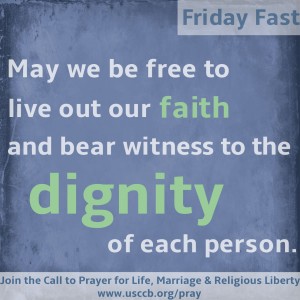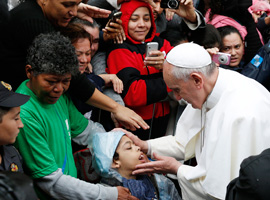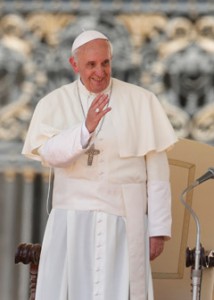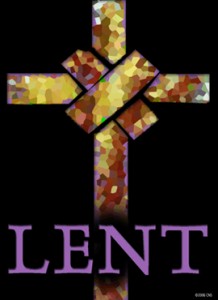“The Masterpiece of Creation”
Pope Francis recently reflected on the Gospel reading of Mark in which the Pharisees, wishing to put Jesus to the test, asked him whether it is lawful to divorce. The Pope reminded his listeners that Jesus “goes right back to the days of creation.” Jesus explains, “But from the beginning of creation, God made them male and female; ‘For this reason a man shall leave his father and mother and be joined to his wife, and the two shall become one. So they are no longer two but one flesh.’”
Pope Francis had much to say about this event and explained quite beautifully that “the Lord is here referring to the masterpiece of creation.” For God “created the light and saw that it was good.” Then “he created the animals, the trees, and the stars: all good.” But “when he created man” he said “that he was very good.” Pope Francis continued, “the creation of man and woman is the masterpiece of creation.” Also because God “did not want for man to be alone: he wanted him to be with his companion, his companion on the journey.” Pope Francis then explained that this moment was also “the beginning of love.” However, he added that “the Lord’s masterpiece was not finished there…the Lord holds up this love contained in the masterpiece of creation in order to explain the love he has for his people. Yet there is another step: when Paul needs to explain the mystery of Christ, he also does so in relation and in reference to the bride. For Christ is wedded: he wedded the Church, his people; as the Father had wedded his people Israel, so Christ espoused his people to himself.”
All of this, the Pope concluded, brings to mind the “plan of love”, “the journey of love of Christian marriage, which God blessed in the masterpiece of his creation with a blessing that can never be taken away. Not even original sin destroyed it.” And “when one considers this,” he quite naturally sees “how beautiful love is, how beautiful marriage is, how beautiful the family is, how beautiful this journey is.”
For Pope Francis’ full reflection, click here.
Archive
Friday Fast: March 28
 Reflection: “Pope Francis has observed that ‘religion [cannot] be relegated to the inner sanctum of personal life, without influence on societal and national life.’ …Every Christian is called to practice charity in a manner corresponding to his or her vocation. Some Catholics, like the Little Sisters of the Poor who run nursing homes for the elderly poor, devote their entire lives to helping others and embrace a vow of poverty themselves” (Archbishop Kurtz).
Reflection: “Pope Francis has observed that ‘religion [cannot] be relegated to the inner sanctum of personal life, without influence on societal and national life.’ …Every Christian is called to practice charity in a manner corresponding to his or her vocation. Some Catholics, like the Little Sisters of the Poor who run nursing homes for the elderly poor, devote their entire lives to helping others and embrace a vow of poverty themselves” (Archbishop Kurtz).
Yet the HHS mandate compels objecting employers to provide coverage for drugs and devices which are against their consciences and threatens the ministries of the Little Sisters of the Poor and many others.
As this and many other lawsuits progress, let us continue our prayer efforts for the protection of the religious freedom so we may practice charity and live out our faith without penalty.
Did You Know? This Tuesday, the Supreme Court heard oral arguments in two cases brought by families who are seeking protection of their religious freedom.
Archbishop Joseph Kurtz, president of the U.S. Conference of Catholic Bishops, shares comments in his op-ed, “Will the Owners of Hobby Lobby Have to Check Their Faith at Their Own Door?”
Archive
The Annunciation and Freedom
“Behold, I am the handmaid of the Lord. May it be done to me according to your word.” (Luke 1: 38).”
Today we celebrate that great event when the Angel Gabriel visited Mary and asked her to be the Mother of God. The Annunciation is a huge solemnity in the Church because it commemorates that moment when God took on human flesh. This day exemplifies God’s love for us in so many ways. All throughout the Old Testament we read about examples when God’s love was rejected by His people. Time and time again, He offered opportunities to accept His love, all the while, allowing His people to choose Him freely (or not choose Him as was often the case). Mary’s fiat or “yes” is celebrated because unlike anyone in history before her, she was completely and unreservedly open to God’s will in her life.
The event of the Annunciation teaches us a great deal about freedom. Often times, when we think of freedom, we see it as the ability to choose between “a” or “b,” without any pressure or influence to choose either one. We often believe that such an influence would be considered an infringement on our freedom. But when we look closer, this view of freedom is devoid of all truth. It assumes there is no difference between the options “a” and “b” and that the only good is the ability to choose. It never considers what is being chosen.
Authentic freedom, on the other hand, is shaped by truth. In the words of John Paul II, “Truth enlightens man’s intelligence and shapes his freedom.” Apart from truth, freedom cannot exist. Take for example persons considered “free” to “express their sexuality” through the use of pornography, a medium that completely disregards the truth of human dignity and what human sexuality is made for. Through this addicting “expression,” a person can quickly become a slave to the sin of pornography. Contrarily, we are most free when we are living according to the truth of our existence. Because she had never been touched by the stain of sin, Mary was completely free to embrace the will of God. She was completely free to live the life she was made to live.
Another lie society tells us is that our ability to choose is simply that, our choice. No one else needs to be involved and no one else should matter. We are autonomous, self-determining individuals, so the theory goes. The Annunciation shows us this is not the case. Mary’s willingness to participate in the event of the Incarnation has affected all of history. All of creation waited in anticipation of Mary’s “Yes.” We are all sharers in the benefit of Mary’s decision to choose the will of God. No choice we make is ever merely personal because we are all connected through our common humanity.
Finally, the Annunciation shows us that we can never truly separate faith and life. This is sometimes difficult to accept, especially within a culture that emphasizes the importance and necessity of separating “Church and state.” Today, it is considered normal to be “personally opposed” to something, but okay with it happening in the public realm. Our Catholic faith is different, however. There is no distinction between the public and private realm when it comes to living out our faith. Everything we do, whether it be eating, sleeping, talking or reading, should be done with an eye to who we are as created beings and why God made us. The Incarnation shows us that the physical matters. Salvation history occurs within history, it is a physical event.
There is a poem by Rev. John Duffy, C.S.s.R. which describes Mary’s first awakening after the Angel Gabriel appeared to her. In describing Mary, the poem explains “She was the Mother of the wandering Word, little and terrifying in her laboring womb. And nothing would again be casual and small, but everything with light invested (italics mine).” The Incarnation displays for us how involved God is in our daily lives. “For God so loved the world that He gave His only begotten Son (John 3:16).” He is not some distant God who creates us and leaves us to figure things out on our own. Instead, God is invested in our lives at every moment. He holds us in being through love, in love, and for love. As John Paul II explained, “man remains a being that is incomprehensible for himself, his life is senseless, if love is not revealed to him, if he does not encounter love (Redemptor Hominis, no 10).” So nothing we do should be separated from this realization that God is Love and desires each of us to be united with Him in Love. When we realize this, “nothing [will] again be casual and small.”
Archive
Catholic Bishops Statement on Decision Overturning Michigan’s Voter Approved Marriage Amendment
 Once again, a federal district court judge has taken it upon himself to redefine marriage, this time in the state of Michigan. U.S. District Judge Bernard Friedman issued a ruling on Friday that overturns the Michigan Constitution, which voters chose to amend in 2004 by defining marriage as between one man and one woman.
Once again, a federal district court judge has taken it upon himself to redefine marriage, this time in the state of Michigan. U.S. District Judge Bernard Friedman issued a ruling on Friday that overturns the Michigan Constitution, which voters chose to amend in 2004 by defining marriage as between one man and one woman.
In a press release issued Friday, the seven Catholic Bishops in Michigan stated, “Today’s decision from federal district court Judge Bernard Friedman to redefine the institution of marriage by declaring Michigan’s Marriage Amendment unconstitutional strikes at the very essence of family, community and human nature. In effect, this decision advances a misunderstanding of marriage, and mistakenly proposes that marriage is an emotional arrangement that can simply be redefined to accommodate the dictates of culture and the wants of adults. Judge Friedman’s ruling that also finds unconstitutional the state’s adoption law is equally of grave concern.” By working through the Michigan Catholic Conference, the Bishops “will collaborate with those who are upholding Michigan’s Marriage Amendment and adoption statute and will assist to the greatest extent possible efforts to appeal Judge Friedman’s most regrettable ruling.”
Michigan Attorney General Bill Schuette immediately filed an emergency request for a stay of the ruling, which was provisionally granted Saturday afternoon and will put Judge Friedman’s decision on hold until at least Wednesday, March 26th.
For the Bishops’ full statement on Judge Friedman’s ruling, click here.
March 24, 2014
Archive
Friday Fast: March 21
Intention: We pray for all fathers, that through the example of St. Joseph, they may fully embrace their vocation and accept the privilege and responsibility of caring for their children as St. Joseph cared for Jesus.
Reflection: On Wednesday, we celebrated the Solemnity of Saint Joseph. In his Apostolic Exhortation, “The Guardian of the Redeemer,” John Paul II referred to St. Joseph as “the guardian and cooperator in the providential mystery of God (no 14).” He explained that together with Mary, Joseph was the first guardian of Christ: “St. Joseph was called by God to serve the person and mission of Jesus directly through the exercise of his fatherhood (no 8).”
It is interesting to note that St. Joseph’s fatherhood and specific role in the plan of salvation would not have been possible apart from his marriage to Mary: “Joseph’s fatherhood – a relationship that places him as close as possible to Christ…comes to pass through marriage to Mary, that is, through the family (no 7).” Let us pray that every husband and wife will be brought closer to Christ through their marriage to one another.
A further reflection on St. Joseph’s participation in the plan of salvation can be found here.
Did You Know? Pope Francis has a deep devotion to St. Joseph. Last year, he chose the Solemnity of St. Joseph as the date for his inaugural Mass. A sign of Pope Francis’ devotion to this Saint can be seen on his coat of arms. Next to the star representing Mary is the spikenard flower, which is often used to represent St. Joseph.
Archive
Solemnity of St. Joseph
Among Saint Joseph’s many titles such as “mirror of patience”, “lover of poverty”, “terror of demons”, “pillar of families”, a particularly interesting one is “the guardian of the mystery of God.” In his Apostolic Exhortation Redemptoris Custos, John Paul II emphasized the importance of this title and the role St. Joseph was given to play in God’s plan of salvation.
Joseph was one of the first to share in the mystery of the Incarnation with Mary. This “sharing” was in a real way an actual participation in Mary’s “yes” at the Annunciation. In taking Mary as his wife instead of divorcing her, “what Joseph did united him in an altogether special way to the faith of Mary. He accepted as truth coming from God the very thing that she had already accepted at the Annunciation (no 4).” Mary and Joseph were one in their desire to follow the Will of God. In a particular way, Joseph silently and courageously took upon himself the many sufferings that Jesus and Mary would bear over the years. Whether by accepting the mysterious nature of Mary’s pregnancy, making the long journey to Bethlehem with no place to stay, and later escaping into Egypt to save Jesus’ life, Joseph fully embraced the supreme honor and responsibility of caring for Mary and Jesus.
It is important to note that Joseph’s fatherhood is tied to his marriage with Mary. In fact, “Joseph’s marriage to Mary is the juridical basis of his fatherhood (no 7).” God chose to have His only Son enter the world in a family. In the beginning of the Old Testament, we are told of a married couple, Adam and Eve, through whom “the source of evil was unleashed on the world (no 7).” It seems fitting therefore, that God would desire to bring salvation to the world through the marriage of Mary and Joseph. In this way, “the savior began the work of salvation by this virginal and holy union, wherein is manifested his all-powerful will to purify and sanctify the family – that sanctuary of love and cradle of life (no 7).”
Through Christ’s being born into and growing up in a family, we see the importance placed upon marriage and the family within salvation history. Each family today is given the opportunity to imitate the Holy Family and therefore participate in salvation history in a distinct way. Each family is a “domestic Church” where, as Pope Francis explained, “we learn to live with others despite our differences and to belong to one another; it is also the place where parents pass on the faith to their children (Evangelii Gaudium, no 66).” Each family is also given the opportunity to ask St. Joseph to guard and protect them as he guarded and protected Mary and Jesus. Let us never hesitate to ask this powerful saint to intercede on behalf of our families. St. Joseph, pray for us!
March 19, 2014
Archive
Friday Fast: March 14
 Intention: Marking the one-year anniversary of Pope Francis’ election this week, we pray that we may follow his humble example and better love “our brethren, especially the weakest and neediest” (Pope Francis, April 24, 2013).
Intention: Marking the one-year anniversary of Pope Francis’ election this week, we pray that we may follow his humble example and better love “our brethren, especially the weakest and neediest” (Pope Francis, April 24, 2013).
Reflection: A year ago this week, Pope Francis captivated the world almost immediately with his humble simplicity, charisma and warmth. Throughout the past year, he has continued to teach us both by his example and his words, inspiring us to look beyond ourselves and encouraging us to “go in search of the people who are the very flesh of Christ” (Vigil of Pentecost, 2013).
In the message from Pope Francis for last year’s Day of Life, we are reminded that “even the weakest and most vulnerable, the sick, the old, the unborn and the poor, are masterpieces of God’s creation, made in his own image, destined to live for ever, and deserving of the utmost reverence and respect.”
Let us ask the Lord how He is calling us to love all of our brothers and sisters, especially the weakest and neediest, and follow where He leads.
Did You Know? The Vatican website features an online book of images and quotes from Pope Francis over the last year.
Archive
On the Occasion of the First Anniversary of Pope Francis’ Pontificate
In honor of Pope Francis’ one-year anniversary as pontiff, we put together a compilation
of some of his memorable quotes on marriage. Let us take this opportunity to thank the
Holy Spirit for the election of this holy man. Viva el Papa!
 Printable Bulletin Insert
Printable Bulletin Insert
“Marriage is between a man and a woman.” Interview with Corriere della Sera (March 5, 2014)
“From the beginning the Creator blessed man and woman so that they might be fruitful and multiply, and so the family then is an image of the Triune God in the world.” Address to the Extraordinary Consistory (February 20, 2014)
“The family is experiencing a profound cultural crisis, as are all communities and social bonds. In the case of the family, the weakening of these bonds is particularly serious because the family is the fundamental cell of society, where we learn to live with others despite our differences and to belong to one another; it is also the place where parents pass on the faith to their children. Marriage now tends to be viewed as a form of mere emotional satisfaction that can be constructed in any way or modified at will.” Evangelii Gaudium, no 66 (Nov 24, 2013)
“The second point: the family is founded on marriage. Through their free and faithful act of love, Christian spouses testify to the fact that marriage, insofar as it is a sacrament, is the foundation of the family and strengthens spousal union and the couple’s mutual gift of self.” Address to the Pontifical Council for the Family (Oct 25, 2013)
“What is marriage? It is a true and authentic vocation, as are the priesthood and the religious life. Two Christians who marry have recognized the call of the Lord in their own love story, the vocation to form one flesh and one life from two, male and female.” Meeting with the Young People of Umbria (October 4, 2013)
“Today, there are those who say that marriage is out of fashion…They say that it is not worth making a lifelong commitment, making a definitive decision, ‘forever’, because we do not know what tomorrow will bring. I ask you, instead, to be revolutionaries.” Address to World Youth Day Volunteers, Brazil (July 28, 2013)
“There is neither real promotion of the common good nor real human development when there is ignorance of the fundamental pillars that govern a nation, its non-material goods…[such as] the family, the foundation of coexistence and a remedy against social fragmentation.” Address to the Community of Varginha, Brazil (July 25, 2013)
“The first setting in which faith enlightens the human city is the family. I think first and foremost of the stable union of man and woman in marriage. This union is born of their love, as a sign and presence of God’s own love, and of the acknowledgment and acceptance of the goodness of sexual differentiation, whereby spouses can become one flesh (cf. Gen 2:24) and are enabled to give birth to a new life, a manifestation of the Creator’s goodness, wisdom and loving plan.” Lumen Fidei, no 52 (June 29, 2013)
Posted: March 13, 2014
Archive
Friday Fast: March 7
 Intention: As we begin Lent, we pray for the strength to commit ourselves to prayer, fasting, and almsgiving so that we may grow to love you, God, more each day.
Intention: As we begin Lent, we pray for the strength to commit ourselves to prayer, fasting, and almsgiving so that we may grow to love you, God, more each day.
Reflection: Lent is here, and it couldn’t come at a better time! Lent is our way of taking a long loving look at ourselves and our lives and asking, “How can I be more faithful to the Gospel and grow deeper in my relationship with God?” To help us answer this question, the Church asks us to consider prayer, fasting, and almsgiving during this season.
Friday’s Scripture readings focus particularly on fasting. During Lent, we may abstain from various things: sweets, soda, idle conversations, etc. But the prophet Isaiah and Jesus remind us that the things which we abstain from should not be done for themselves alone, but to change our hearts. When we give up something, emptiness is created in our lives. We are called to fill that emptiness with God. Isaiah gives us a clue as to what this looks like in a concrete way: justice, sharing, care for the unwanted and mistreated. What will you give up this Lent and how will this lead you closer to God?
Did You Know? There is a difference between fasting and abstaining. In the Latin Church, fasting means only taking one full meal for that day, with the possibility of two smaller meals that do not equal a full meal. Abstinence is the act of going without something, such as meat from our Fridays during Lent. Click here for more information on fasting and abstinence.
